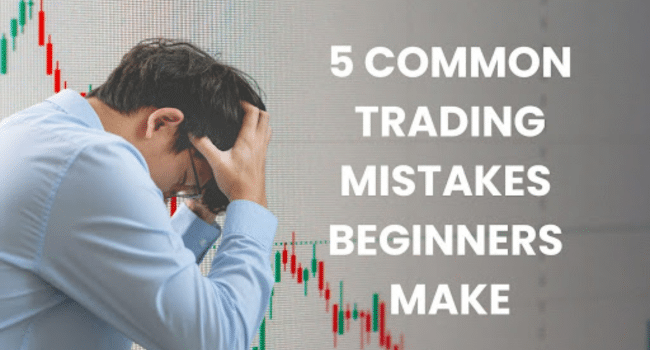Table of Contents
Many new traders believe trading is just about reading charts, using indicators, and spotting candlestick patterns. But in reality, trading is 80% about controlling your emotions and only 20% about technical knowledge. The real challenge is not on the screen, it’s in the trader’s mind.
Most people don’t lose money because of bad strategies. They lose because of emotional decisions. Greed makes them hold on too long. Fear makes them sell too early. Overconfidence leads to bigger mistakes. Before learning charts, a trader should learn to stay calm and think clearly.
Here are 5 common trading mistakes that start in the mind and affect the money later.
Mistake #1: Lack Of Market Education
Many beginner traders jump into the stock market just because friends or family are doing it. Without understanding how the market works, they start taking trades based on guesswork or tips. This lack of knowledge about market fundamentals and financial instruments often leads to poor decisions, quick losses, and exiting trades too early. Without the right education, trading becomes more like gambling than a planned activity.
The best way to avoid this mistake is through continuous learning. Spending some time every day to understand technical and fundamental analysis is important, as they form the basic foundation of trading. After gaining some knowledge, it’s helpful to build a simple trading strategy based on personal risk capacity. Once the plan is ready, starting with paper trading is a good idea. It allows traders to test their strategies and gain confidence without risking real money.
If you’re looking for a structured set of trading ideas to learn and apply, this Trading book is a great resource. It compiles practical setups and strategies used by real traders, perfect for those starting or refining their current plans.
Mistake #2: Trading Without a Structured Plan
One of the most common mistakes beginners make is not having a proper trading plan. Many people enter trades just by following a tip, reacting to the news, or going with their gut feeling. This often leads to quick, emotional decisions and inconsistent results.
Without a clear structure, traders tend to panic when they see their profit and loss statements. This emotional reaction causes them to make irrational choices, like exiting too early or holding on for too long, which eventually results in losses.
To overcome this, start by setting clear goals for trading. Then, create a simple plan that explains when to buy or sell based on the strategy, how much money to risk, and how big each trade should be, depending on the capital. Keep a basic journal to note down each trade, the reason behind it, and key learnings to improve over time.
Mistake #3: Ignoring Risk Management
Many newbie traders directly jump into trading without knowledge or proper risk management. They focus only on how much profit they can make, but forget to protect their capital. This leads to a situation where just a few bad trades can wipe out a large part of the trading account. Without clear rules on how much to risk per trade or where to place a stop-loss, losses can quickly get out of hand.
The best way to tackle this is by using a stop loss to limit potential losses and risking only a small part of the capital on each trade, usually around 1 to 2 percent. This helps prevent any single loss from causing major damage. It’s also important to avoid overtrading or taking trades out of frustration, as these often lead to emotional and poor decisions.
Mistake #4: Emotional Trading
Emotional trading is a common mistake that can seriously affect trading results. When trades start going well, greed often takes over, and traders hold their positions too long, hoping for even bigger profits. But if the market suddenly moves in the opposite direction, those open positions can quickly turn into losses.
On the other hand, when traders are in a losing trade, fear kicks in. They keep holding the position, hoping the loss will reduce, but it often gets worse. This mix of fear and greed leads to poor decisions and bigger losses than expected.
To overcome this, follow a fixed trading plan with pre-decided entry and exit points to avoid emotional decisions. Take breaks after big losses and practice awareness to control fear and greed during trades.
Mistake #5: Revenge Trading
Revenge trading happens when a trader tries to recover losses by immediately jumping into new trades, often without a proper plan. It’s usually driven by anger, frustration, or the urge to “win back” what was lost. Instead of thinking clearly, the trader takes bigger risks, increases position sizes, and ends up making emotional decisions. This often leads to even larger losses and a broken trading mindset.
To overcome revenge trading, take a break after a loss and avoid jumping into trades emotionally. Focus on reviewing the mistake calmly and return only with a clear, planned strategy.
Bottomline
Most traders don’t fail because the market is too tough; they fail because they aren’t prepared mentally. Strategies can be learned, but lasting success comes only when discipline and emotional control become part of the process.
